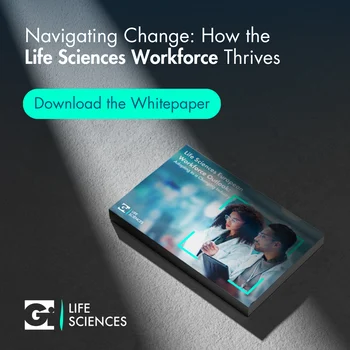Career opportunities in the Life Sciences field and related industries are growing and they offer fulfilling employment to right-skilled and right-trained professionals. However, as with a number of other sectors at the moment, there is a significant challenge in Europe in matching skilled, experienced individuals with open roles that best suit their skills strengths and professional experience. This is a key finding from Gi Life Sciences’ recent report, Life Sciences European Workforce Outlook, produced in cooperation with the labour market analytics firm Lightcast. This research shows that there are, in fact, a number of issues (skill shortages, regulatory complexities and demographic shifts) which are making talent sourcing and mapping, planning for future hires and ability to build quality retention programmes more complicated.
What emerges clearly is: success in today’s Life Sciences workforce depends on creating meaningful connections - between people, skills, and opportunities - to drive sustainable progress.
Below is a set of recommendations designed to help businesses and organisations in the Life Sciences sector enhance their approach to securing the top-level talent required.
- Skills-Based Hiring: Focus on tangible skills over traditional qualifications to access a broader talent pool. This approach can bridge gaps in rapidly evolving areas like AI, MedTech and personalised medicine and connect the right people to the right roles - faster and more effectively.
- Upskilling and Reskilling: Invest in targeted training for current employees to address future needs, including technical and leadership skills. This includes creating clear career pathways and fostering a culture of continuous growth for employee teams.
- Diversifying Workforce Models: Employ flexible models combining permanent, contingent and outsourced talent to adapt to changes in regulation, innovation and demand.
- Tapping Underrepresented Talent Pools: Encourage greater participation of women, older workers, and individuals from emerging markets. Provide mentorship, leadership opportunities, and flexible arrangements to unlock untapped potential. Creating inclusive, supportive connections is not only the right thing to do - it’s a strategic advantage.
- Geographical Diversification: Leverage talent hubs in emerging and fast-growing markets like those highlighted in our Gi Life Sciences market research (e.g., Bulgaria and Latvia, which offer cost advantages and skilled workforces; or Denmark and Ireland, which offer rapid market growth and strengths in skills for biopharma, MedTech and research).
- Future-Focused Recruitment: Align workforce strategies with emerging trends, such as the growing demand for expertise in AI, diagnostics, and healthcare for an ageing population. Hiring with the future in mind ensures your teams are ready to lead the next wave of scientific progress.
- Partnerships and Outsourcing: Collaborate with specialised staffing agencies or consultants to optimise recruitment processes, manage large-scale projects, and access industry-specific expertise. Strong external connections enable organisations to scale and adapt with greater confidence.
These are just a few steps that can be taken to put in place strategies for building a resilient, inclusive and innovative workforce capable of driving the Life Sciences sector forward. My team and I are here to provide advice on which of these steps might most benefit your organisation’s needs or whether a combination of them might be useful for you. Thinking global, agilely and differently are the best way forward for building hiring plans that overcome current skills gaps and help an organisation invest properly and wisely in building future, right-skilled talent pools. Progress starts with the right plan - and the right connections. But you need to start today.
Want to dive deeper into these insights? Explore our latest webinar to learn more.
If you're looking for support to navigate challenges such as these, we can help. Enter your details into our form and our team of experts will connect to explore how we can support your goals.
Because great connections do more than build teams.
They ignite innovation and empower individuals.
Great Connections Bring Progress.

.png)

